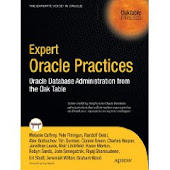The first one only had a couple of attendees (including OakTable fellow Christian Antognini from Switzerland), so we could gather around my laptop and do a real "Optimizer Hacking Session". Actually we had to do that because the projector promised by DOAG wasn't there. I talked mainly about some common traps when performing SQL statement troubleshooting and what to do in order to avoid them, but also showed some cool stuff that I'll shortly blog about separately.
The second session two hours later was attended by many more than I expected, so there was no chance at all to gather around my laptop. Originally I planned to talk about some common pitfalls why the estimates of the optimizer can go wrong (even with 100% computed statistics) and what to do about, but I then realized that I should at least give a short summary of what I've shown in the first session to those that hadn't attended (which were most of the attendees anyway). This started off an interesting discussion with many questions - a surprising number revolved around the usage of user-defined PL/SQL functions.
Since even the WiFi connection didn't work properly I could only mention briefly some important articles that should be read if one wants to get a good understanding of how the optimizer can (actually should!) be helped when dealing with PL/SQL functions.
So for reference I repeat here a summary of relevant articles:
1. Expert Oracle Practices (the book I co-authored), Chapter 7, "PL/SQL and the CBO" by OakTable fellow Joze Senegacnik
2. OakTable Member Adrian Billington on pl/sql functions and cbo costing, which is inspired by Joze's work above
3. Adrian Billington on "setting cardinality for pipelined and table functions"
4. Adrian Billington's generic "Collection Cardinality Utility", for background info see the article above, the source code includes a description when and how to use it
5. The problem of the CBO ignoring the projection for costing, described on my blog
There were some other questions in the same context, for example, what would a Real Time SQL Monitoring report look like with user-defined PL/SQL functions - here is an example you can view / download (remember that the file can be shared since it is self-contained) that is taken from a query quite similar to the one described in my blog post. By the way, it's a query that gives the approach a try discussed during the session if there a chance of getting the "projection" cost right by playing clever tricks that combine projection and selection. I didn't get it to work as desired, but at least the "selection" cost showed up, which however doesn't address the actual problem of the "projection" cost in my particular test case. So Oracle still attempts to merge the views and has then to run the user-defined function many more times than necessary - in fact the query represents the worst case because the user-defined function is called for both, selection and projection.
You can see from the report that at least some PL/SQL time shows up, but it also shows a deficiency of the report - it doesn't show detailed logical I/O values, only a summary of Buffer Gets.
And interestingly, although nothing about this is visible from the end-user report, the report file itself (in the XML data section) contains at least a couple of optimizer parameter settings - to address another question raised during the session.
All in all I really liked these sessions and I hope the attendees enjoyed them as much as I did.
Last, but not least: It's not definitive yet but very likely I'll give a few free "Optimizer Hacking Sessions" in the future on the internet, so stay tuned!


No comments:
Post a Comment
Note: Only a member of this blog may post a comment.